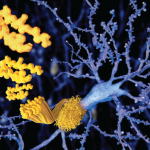Preliminary results from the U.K. group were reported at the British Society for Rheumatology in Birmingham, U.K. in April, with a follow-up article in Alzheimer’s & Dementia.5,6 They studied incident diagnoses of RA in patients aged 18 and up from 1995–2011. At Year 5, the rate of dementia among DMARD users was 0.5%, compared with 1.6% for non-users, and at Year 15, it was half the rate of non-users. These findings offer tantalizing potential that rheumatology therapies may someday have a role in preventing or delaying the advance of dementia. However, Dr. Edwards emphasizes that this is still several years and well-funded randomized controlled trials into the future.

Prof. Holmes
Clive Holmes, PhD, a professor of biologic psychiatry at the University of Southampton, who has studied Alzheimer’s and other chronic neurologic conditions for years, including the role of the neuroinflammatory response, is part of the team working with the rheumatology researchers. In an email, he tells The Rheumatologist that the DMARD research follows a long series of studies in people with Alzheimer’s disease.
“We found that inflammation outside the brain, for example, caused by infections, tissue injury or diseases, such as RA, was associated with a marked decline in cognitive function in people with Alzheimer’s disease,” Prof. Holmes says. “We looked at a number of blood markers of this inflammation and found that TNF-alpha was most clearly associated with this decline.” Those with systemic inflammation associated with a raised peripheral pro-inflammatory cytokine signal had a more rapid long-term cognitive decline and exaggerated sickness-behavior symptoms.
“Our preliminary results support the idea that etanercept might slow Alzheimer’s disease progression,” he adds. “A recent Phase 2 study we conducted of treatment with etanercept was well tolerated in a group of patients with mild to moderate Alzheimer’s disease and had indications of beneficial effect.”7
Confounding Complications
Potentially confounding variables for these findings, which the U.K. researchers tried to overcome using propensity score matching, include age, sex, disease duration and severity, comorbidities, body mass index, alcohol and tobacco use, and use of other medications, such as steroids.
Now, contradictory findings—documenting a higher risk of dementia for patients receiving DMARDs—have been reported from Taiwan in Toxicology and Applied Pharmacology.8 The authors reviewed the literature for mechanisms of MTX-induced dementia in a logistical regression analysis of the association between use of DMARDs and risk of dementia in the Taiwanese National Health Insurance Research Database in patients aged 20 years and older newly diagnosed with RA between 2000 and 2011 (87% were aged 65 and above). They found significant association with the development of dementia, compared with patients who do not receive DMARDs.

